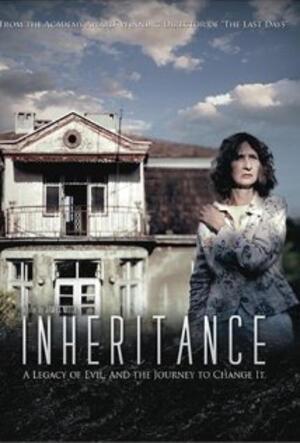Two women’s lives collide in the film “Inheritance”
Like our genes, we inherit the stories of our families. But the truth behind those stories revealed over time can alter our perceptions of who we think we are and how we view our world.
On this date, Mary McNamara reviewed the film Inheritance for the Los Angeles Times. It tells the story of Monika Hertwig, who was told as a child that her German father had died for his country as a war hero in World War II. But when she was 11, her mother’s angry remark that Monika was just like her father and would die like him too forced Monika’s grandmother to reveal the truth: Her father was Amon Goeth, the murderous commandant of Plaszow work camp in Poland, hanged for his crimes when Monika was just 10 months old. The full consequences of what her father had done was not evident until she saw Steven Spielberg’s movie Schindler’s List, where her father was portrayed by Ralph Fiennes. This new story of her father deeply affected Monika, who at first hated Spielberg for telling it. But over time, she wished that she could meet with survivors of her father’s murderous reign at the camp.
Inheritance director James Moll was working on a documentary associated with Schindler’s List when he contacted Monika Hertwig to ask permission to use photographs of Goeth. Monika had seen on German TV camp survivor Helen Jonas-Rosenzweig, who was interned during World War II at Kraków–Płaszów and forced to work as a maid for Amon Goeth. Moll consented to arrange for the two women to meet and film their encounter. Helen traveled to Krakow with her daughter from their home in New Jersey, and Monika made the journey from her German hometown.
In 2004, the two women met at the monument that marks the ruins of Plaszow. McNamara wrote in her review, “It is hard to say which is more difficult to witness, the horrible truth coming out of Helen's lipsticked mouth or the look on Monika's face as she visibly ages with each horrible detail. And once she has taken in the enormity of her father's actions, she must face, perhaps for the first time, her mother's complicity, her ability to sunbathe or lounge in the bath while mass murder was taking place outside.”
Moll’s film depicts their meeting as it happens, with little editing and no scripted lines. He said later that once the meeting began, he refused to stop them as his camera changed film, that it was more important to preserve their intimacy. After its debut at the Los Angeles Film Festival, Inheritance was shown on PBS’s documentary series POV. A conversation with the filmmaker and both women can be seen here. Inheritance received an Emmy award for Outstanding Interview by the National Academy of Television Arts and Sciences in 2009.
McNamara ends her review by noting, “It is that raw, unfiltered, uneasy, uncomfortable intimacy that makes this, as one audience member later remarked, much more than just another Holocaust movie. Here, in these women's tears and twisted smiles, in their attempt to make sense of events beyond comprehension are the living wounds of history–terminal and undeniable.”
Source: “Holocaust collides in 2 lives, as the camera rolls,” Los Angeles Times, June 29, 2006; “Beyond the Film with James, Monika and Helen” and “Inheritance,” PBS.




thank you for this offering. Since the cruelty and insanity in our world continue in new and old ways, I join and appreciate your efforts; the efforts of women. as a Jew who understand that many just like us still need to justify their existence, I bless and wish for more tolerance to spread in our world.